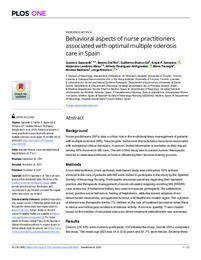Título :
Behavioral aspects of nurse practitioners associated with optimal multiple sclerosis care in Spain |
Autor :
Saposnik, Gustavo 
Del Río, Beatriz
Bueno-Gil, Guillermo
Perez-Sempere, Angel 
Lendínez-Mesa, Alejandro
Rodríguez-Antigüedad, Alfredo
Terzaghi, María
Medrano, Nicolás
Maurino, Jorge  |
Editor :
Marcello Moccia, Universita degli Studi di Napoli Federico II, ITALY |
Departamento:
Departamentos de la UMH::Medicina Clínica |
Fecha de publicación:
2021-12 |
URI :
https://hdl.handle.net/11000/33769 |
Resumen :
Background
Nurse practitioners (NPs) play a critical role in the multidisciplinary management of patients with multiple sclerosis (MS). Neurologists´ behavioral characteristics have been associated with suboptimal clinical decisions. However, limited information is available on their impact among NPs involved in MS care. The aim of this study was to assess nurses´ therapeutic choices to understand behavioral factors influencing their decision making process.
Methods
A non-interventional, cross-sectional, web-based study was conducted. NPs actively involved in the care of patients with MS were invited to participate in the study by the Spanish Society of Neurology Nursing. Participants answered questions regarding their standard practice and therapeutic management of seven simulated relapsing-remitting MS (RRMS) case scenarios. A behavioral battery was used to measure participants´ life satisfaction, mood, positive social behaviors, feeling of helpfulness, attitudes toward adoption of evidence- based innovations, occupational burnout, and healthcare-related regret. The outcome
of interest was therapeutic inertia (TI), defined as the lack of treatment escalation when there is clinical and radiological evidence of disease activity. A score to quantify TI was created based on the number of simulated scenarios where treatment intensification was warranted.
Results
Overall, 331 NPs were invited to participate, 130 initiated the study, and 96 (29%) completed the study. The mean age (SD) was 44.6 (9.8) years and 91.7% were female. Seventy-three participants (76.0%) felt their opinions had a significant influence on neurologists´ therapeutic decisions. Sixteen NPs (16.5%) showed severe emotional exhaustion related to work and 13 (13.5%) had depressive symptoms. The mean (SD) TI score was 0.97 (1.1). Fifty-six of NPs showed TI in at least one case scenario. Higher years of nursing experience (p =
0.014), feeling of helpfulness (p = 0.014), positive attitudes toward innovations (p = 0.046), and a higher intensity of care-related regret (p = 0.021) were associated with a lower risk of TI (adjusted R2 = 0.28). Burnout was associated with higher risk of TI (p = 0.001).
Conclusions
Although NPs cannot prescribe MS treatments in Spain, their behavioral characteristics may influence the management of patients with RRMS. Continuing education and specific strategies for reducing occupational burnout may lead to better management skills and improve MS care.
|
Palabras clave/Materias:
Esclerosis múltiple
Enfermería |
Área de conocimiento :
CDU: Ciencias aplicadas: Medicina |
Tipo de documento :
info:eu-repo/semantics/article |
Derechos de acceso:
info:eu-repo/semantics/openAccess
Attribution-NonCommercial-NoDerivatives 4.0 Internacional |
DOI :
https://doi.org/10.1371/journal.pone.0261050 |
Publicado en:
PLoS ONE 16(12): e0261050 |
Aparece en las colecciones:
Artículos Medicina Clínica
|
 La licencia se describe como: Atribución-NonComercial-NoDerivada 4.0 Internacional.
La licencia se describe como: Atribución-NonComercial-NoDerivada 4.0 Internacional.
.png)
